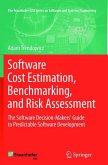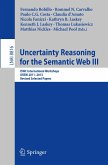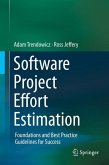The main goal of this book is to help organizations improve their effort estimates and effort estimation processes by providing a step-by-step methodology that takes them through the creation and validation of models that are based on their own knowledge and experience. Such models, once validated, can then be used to obtain predictions, carry out risk analyses, enhance their estimation processes for new projects and generally advance them as learning organizations.
Emilia Mendes presents the Expert-Based Knowledge Engineering of Bayesian Networks (EKEBNs) methodology, which she has used and adapted during the course of several industry collaborations with different companies world-wide over more than 6 years. The book itself consists of two major parts: first, the methodology's foundations in knowledge management, effort estimation (with special emphasis on the intricacies of software and Web development) and Bayesian networks are detailed; then six industry case studies are presented which illustrate the practical use of EKEBNs. Domain experts from each company participated in the elicitation of the bespoke models for effort estimation and all models were built employing the widely-used Netica (TM) tool. This part is rounded off with a chapter summarizing the experiences with the methodology and the derived models.
Practitioners working on software project management, software process quality or effort estimation and risk analysis in general will find a thorough introduction into an industry-proven methodology as well as numerous experiences, tips and possible pitfalls invaluable for their daily work.
Emilia Mendes presents the Expert-Based Knowledge Engineering of Bayesian Networks (EKEBNs) methodology, which she has used and adapted during the course of several industry collaborations with different companies world-wide over more than 6 years. The book itself consists of two major parts: first, the methodology's foundations in knowledge management, effort estimation (with special emphasis on the intricacies of software and Web development) and Bayesian networks are detailed; then six industry case studies are presented which illustrate the practical use of EKEBNs. Domain experts from each company participated in the elicitation of the bespoke models for effort estimation and all models were built employing the widely-used Netica (TM) tool. This part is rounded off with a chapter summarizing the experiences with the methodology and the derived models.
Practitioners working on software project management, software process quality or effort estimation and risk analysis in general will find a thorough introduction into an industry-proven methodology as well as numerous experiences, tips and possible pitfalls invaluable for their daily work.








